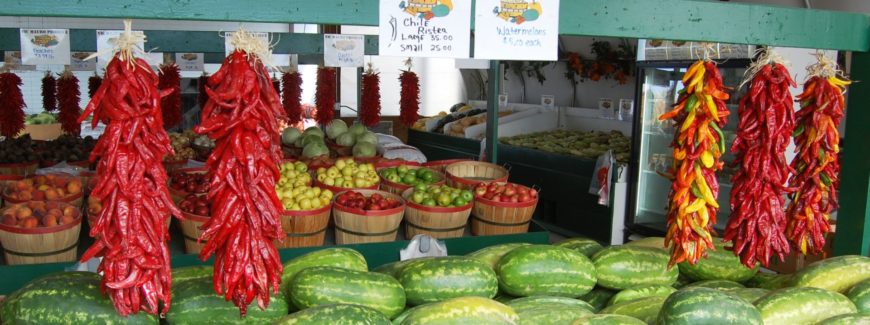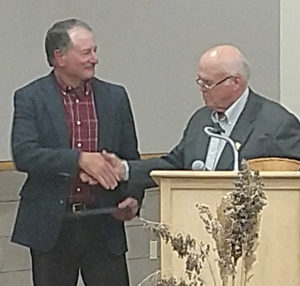
Mike Bartolo, manager at the Colorado State University Arkansas Valley Research Center, was honored at the Rocky Ford Chamber of Commerce Annual Ag Appreciation Dinner, and recently recognized for 30 years of service to Extension.
The annual banquet recognizes an agricultural producer or someone who has contributed to the agriculture community in the Arkansas Valley. Earlier recipients included the centennial farms in Crowley and Otero counties. This year’s awards recognized both Bartolo’s accomplishments and the value of the Arkansas Valley Research Center to the local community.
The research center was established Sept. 17, 1888, and is the second-oldest continuously operated center in Colorado. It sits on 104 acres, 90 of which are in production, and is part of a network of eight research centers at nine sites in the state. An animal disease diagnostic laboratory, serving southern Colorado and administered by the CSU College of Veterinary Medicine and Biomedical Sciences, is also housed at the center.
Bartolo is a native of the Arkansas River Valley. He was born and raised on a farm between the research center and Pueblo. After his graduate studies he went home to the valley, where he has managed the research center since 2004. He has been an Extension vegetable crop specialist since 1991.

Bartolo’s primary responsibilities are research and outreach activities to support commercial vegetable production in the Arkansas valley, where the major crops are onions, melons, and peppers. At the research center, Bartolo has investigated drip irrigation, plastic mulches and soil fertility, pest management and, most recently, pepper varieties suited to the area.
“There really is no way to measure what he has done for my farm and the other chile growers in this community,” said Shane Millberger, owner of Milberger Farms in Pueblo. “We have developed our Passion for Pueblo chile, which is a credit to Dr. Bartolo. The varieties that he has developed have significantly benefited our farm — from the processing end to the retail. My farm has grown over the past 30 years to what it is today due to the expertise he shares with us.”
True team player
Bartolo advises both commercial growers and Extension agents in the area on current agronomic issues, and has been at the forefront of research and outreach on melon production and food safety. Extension agents, researchers and administrators agree that he is a strong advocate for the development for cross-discipline communication when agriculture producers need answers for problems or issues.
“Mike is a true team player, not only with agriculture producers in the area, but with all CSU staff as well,” said Bruce Fickenscher, Extension range and livestock agent in the southeast area. “To Mike, it is not us (experiment station) and them (extension); it is we as CSU, as an institution, for the people.”
“He is a huge asset to the area vegetable producers as well as the local Extension agents. His knowledge of the local crops, farmers and the area is second to none,” said Tom Laca, small acreage, range and natural resources management Extension agent in Pueblo County. “He is always willing to advise and assist with any questions we may have. His expertise and research has benefited many in our area.”
Bartolo says that the underlying theme — the best use of natural resources — is behind all of the research he’s been a part of over the years at the center. “Whether in the past 12 years that I have been manager, or over the past 128 years, it has been especially related to water. Research on irrigation efficiency using drip irrigation has become more prominent in recent years,” Bartolo noted. There is an increased focus on crops and cultivars that can perform best under the environmental conditions in the Arkansas River Valley, in many cases with reduced water use and in higher salinity soils.
“I still turn to Mike and the research center for advice every year about different issues in our chile production,” Millberger said.